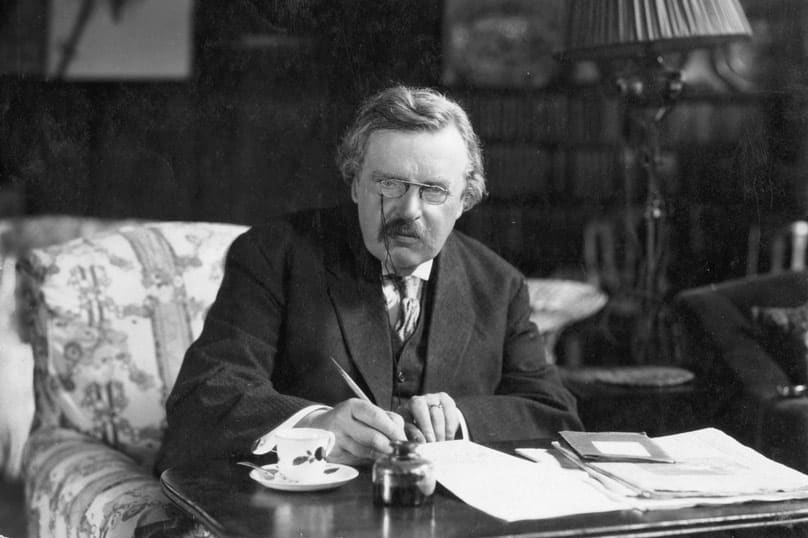
The Victorian government decision to warn against fairy tales on account of the gender bias they supposedly contain has been acutely analysed by Anthony Cleary a few weeks ago (Catholic Weekly 16 April 2017), but the episode prompts me to recall the special value that G K Chesterton ascribed to fairy tales, and to wonder what he would have said to the Victorian Premier if he had been able to comment on this part of the Respectful Relationships program.
Chesterton nursed a deep appreciation of fairy tales, and I suspect he would have been moved to gentle mockery by any attempt to recruit them in the cause of identity politics.
He may even have suggested that, under the current government, Melbourne risked becoming a reverse of the familiar Dickens title: it would now be ‘a city of two tales’, countering fairy tales that are grounded in reality while replacing them with false tales that are founded on fantasy.
The Victorian program is not only promoting ideological correctness in sex – and fabricating how young children actually relate to life – but, at the same time, distracting attention from the important pictures of reality that are found in fairy tales.

To Chesterton, fairy tales were all about reality. They were not an indulgence in fantasy or ‘make believe.’ On the contrary, they contained what he called ‘the deepest truth of the earth, the real record of men’s feeling for things.’ He noted, for example, one of the moral truths he had imbibed from the fairy tale, Beauty and the Beast – ‘the eternal and essential truth that until we love a thing in all its ugliness we cannot make it beautiful.’ (Twelve Types, 1902)
Chesterton devoted an entire chapter, ‘The Ethics of Elfland,’ in his classic work, Orthodoxy (1908), to showing how fairy tales supplied his earliest intellectual formation. “My first and last philosophy,” he wrote, “that which I believe in with unbroken certainty, I learnt in the nursery.” Fairyland was for him “the sunny country of common sense” – and fairy tales the source of a sound philosophy of life.
In another place, he explained that the core of fairy tales is also the core of ethics – that “peace and happiness can only exist on some condition. . . . that all happiness hangs on one thin veto; all positive joy depends on one negative. . . . that, if one does the thing forbidden, one imperils all the things provided.”
He went on to illustrate the many fundamental truths revealed in fairy tales:
“Cinderella may have a dress woven on supernatural looms and blazing with unearthly brilliance; but she must be back when the clock strikes twelve …
“A girl is given a box on condition she does not open it; she opens it, and all the evils of this world rush out at her. A man and woman are put in a garden on condition that they do not eat one fruit: they eat it, and lose their joy in all the fruits of the earth.” (All Things Considered, 1908)
While the Victorian government looks to encouraging children to act as ‘fairytale detectives’ and identify gendered messages in fairy tales, Chesterton focused on the principal truths about life that are there to be discovered.
He was aware that some people thought fairy tales were bad for children – as when, on one occasion, a lady wrote to him that it was cruel to tell children such tales as it frightened them. Chesterton’s response was that this misunderstands the nature of children who, if denied stories about scary mythical creatures like goblins, will simply conjure them up for themselves. Children are alarmed at this world, Chesterton argued, because it is a very alarming place.
Their fear does not come from fairy tales: it comes from what Chesterton called “the universe of the soul.” He then explained how fairy tales fill out the child’s understanding of reality:
“Fairy tales do not give the child the idea of the evil or the ugly; that is in the child already, because it is in the world already.
Fairy tales do not give a child his first idea of bogey. What fairy tales give the child is his first clear idea of the possible defeat of bogey. The baby has known the dragon intimately ever since he had an imagination. What the fairy tale provides for him is a St George to kill the dragon” (Tremendous Trifles, 1909).
The Victorian government’s concern about the damaging effects of fairy tales bears out, in a peculiar and even perverse way, Chesterton’s high appreciation of such childhood literature. The government is only pursuing such programs of social engineering because it recognises the powerful impact that fairy tales can have on the very young. What a pity it failed to consult Chesterton’s writings on the subject, and spend some time in “the sunny country of common sense” – and thus avoid the embarrassment of a monumental missing of the point
